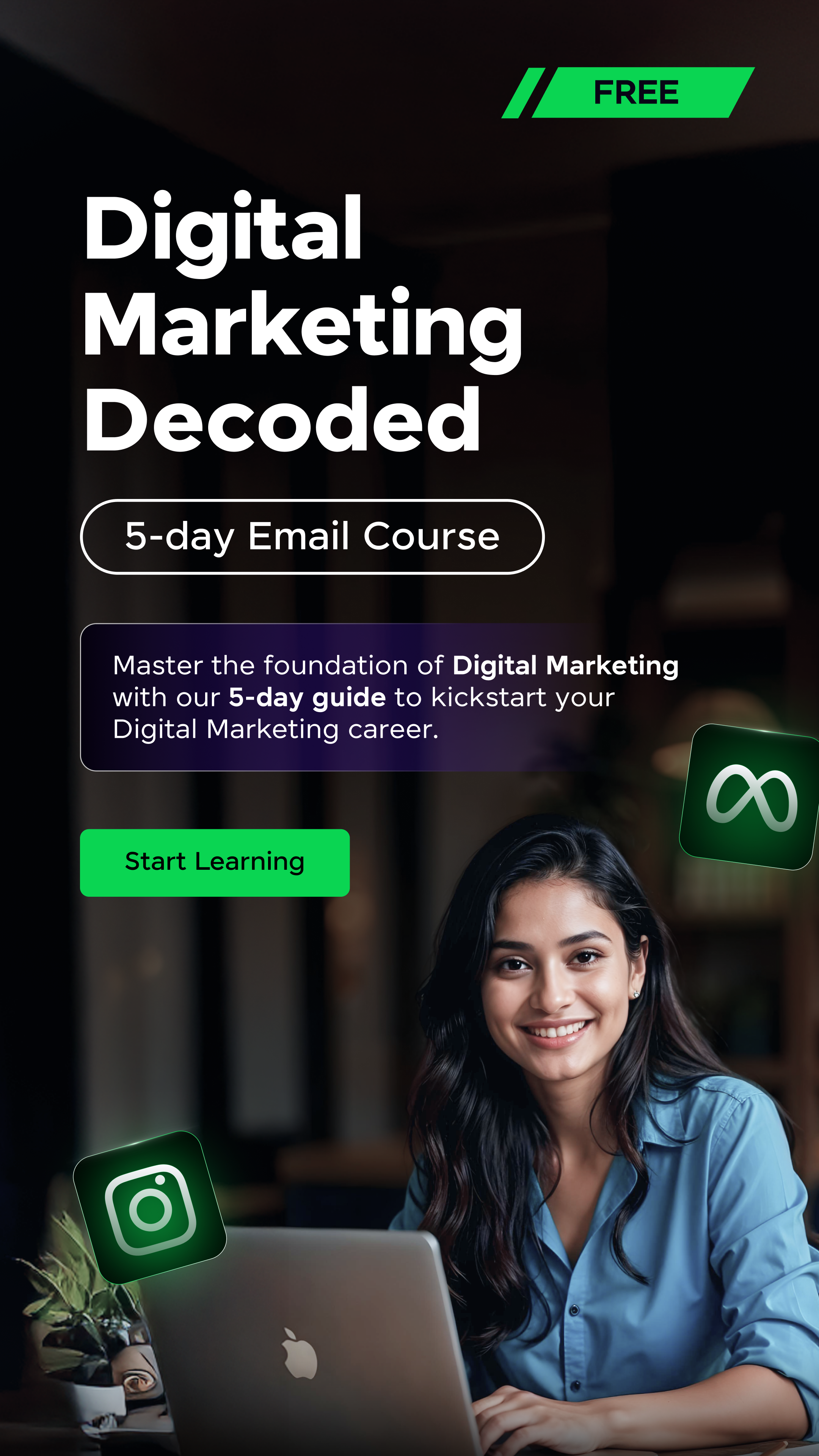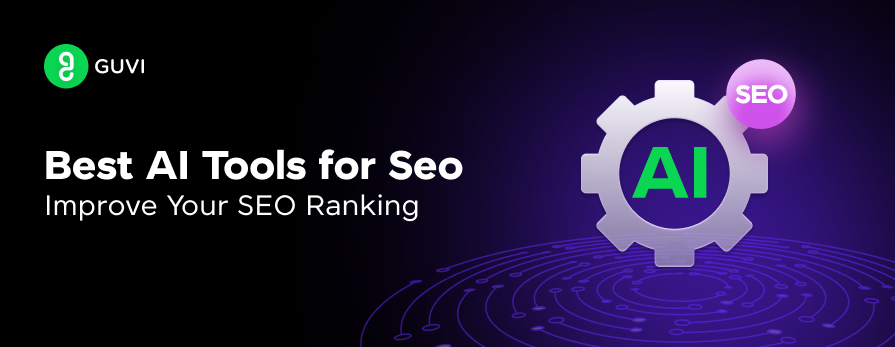
16 Types of Digital Marketing: Best Mediums For 2025
Mar 24, 2025 10 Min Read 5204 Views
(Last Updated)
Have you ever wondered how brands manage to stay at the top of your search results or appear on your social media feeds just when you need them? This is no coincidence but the result of a meticulously planned strategy known as digital marketing.
But what makes digital marketing so pivotal in today’s business landscape? It’s the strategic use of various marketing channels to reach your audience and put your product/service in just the perfect spotlight.
With the internet becoming the cornerstone of how we shop, communicate, and consume information, understanding the various types of digital marketing has never been more crucial.
So, what are the various types of digital marketing that everyone is talking about? This comprehensive blog will cover 16 digital marketing types along with their benefits and usage so that you can make your digital marketing strategy bulletproof in 2025. So, let’s dive right in!
Table of contents
- What is Digital Marketing?
- Types of Digital Marketing
- Search Engine Optimization
- Paid Advertising (PPC)
- Search Engine Marketing (SEM)
- Social Media Marketing
- Influencer Marketing
- Content Marketing
- Email Marketing
- SMS Marketing
- Video Marketing
- Audio Marketing
- Affiliate Marketing
- Mobile Marketing
- Native Advertising
- Website Marketing
- Chatbot Marketing
- Augmented Reality and Virtual Reality Marketing
- Final Words
- FAQs
- What is the most effective type of digital marketing?
- How do I choose the right digital marketing strategies for my business?
- Can digital marketing work for small businesses?
- How important is mobile marketing in today's digital marketing strategies?
- How to measure the success of digital marketing campaigns?
What is Digital Marketing?
Digital marketing is an umbrella term that encompasses all marketing efforts leveraging digital channels to reach and engage customers online.
It’s a multifaceted strategy that includes everything from social media to search engines and email campaigns, aiming to connect businesses with their target audience in the space where they spend a significant amount of their time: online.
The importance of digital marketing lies in its ability to offer precision targeting, measurable results, and the flexibility to adapt to changing consumer behaviors, making it essential for businesses aiming to thrive in today’s digital-first world.
Know More: What is Digital Marketing? Complete Beginner’s Guide
From startups to multinational corporations, the digital space offers a level playing field for all while trying to grab the consumer’s attention. It offers a huge impact at a much lower cost. Obviously, it’s the first choice of today’s brands. But there are various types that you can use as per product. Let’s discover them.
Enrolling in GUVI’s Digital Marketing course can help you become an expert in the digital world, regardless of your level of marketing expertise. Learn the ins and outs of email marketing, social media marketing, content production, SEO, and more from professionals in the field. Through practical projects and real-world case studies, acquire job-ready skills with globally recognized certifications.
Additionally, if you want to explore Marketing Research Techniques through a Self-paced course, try GUVI’s Marketing Research Techniques certification course.
Types of Digital Marketing
With the ‘netizens’ increasing exponentially, today’s marketing isn’t just limited to being present online, but it’s about being omnipresent in a way that resonates with your audience. The types of digital marketing are like tools in a marketer’s toolbox, with each one serving a specific function to build a comprehensive online presence.
Whether it’s engaging with customers through social media, optimizing content for search engines, or leveraging email campaigns for direct outreach, understanding how to effectively use these tools is key to achieving marketing success.
Also Read | The Best B2B Digital Marketing Strategies That You Need to Adopt in 2025
Let’s dive into the specifics of each type of digital marketing, exploring their definitions, key considerations for implementation, and the advantages they bring to the marketing table.
1. Search Engine Optimization
Our first type of digital marketing, Search Engine Optimization, or SEO, is the art and science of enhancing your online content so that a search engine likes to show it as a top result for searches of a certain keyword.
It focuses on improving your website’s visibility in organic search results, making it more accessible to people who are using search engines to find information, products, or services related to your business.
You have to make various optimizations to your content, web pages, ads, etc. following the SEO best practices. Compared to all other types of marketing, it’s pretty organic and valuable for the target audience and brand building.
Important things to consider while implementing SEO:
- Understand audience search intent through thorough keyword research.
- Optimize content and website structure for search engines.
- Acquire reputable backlinks to increase site authority.
- Ensure mobile responsiveness and quick site load times.
- Keep content fresh with regular updates.
Advantages of performing SEO:
- Increases website visibility and traffic.
- Attracts targeted audience segments.
- Improves engagement rates and potential conversions.
- Enhances long-term brand credibility and authority.
Also Read | Watch Out For These Digital Marketing Trends in 2025 or You’ll Miss Out!
2. Paid Advertising (PPC)
Paid Advertising, often referred to as Pay-Per-Click (PPC), is a model of Internet marketing where advertisers pay a fee each time one of their ads is clicked.
Essentially, it’s a way of buying visits to your site, rather than attempting to “earn” those visits organically. PPC can deliver targeted traffic swiftly, but requires a strategic approach to budgeting, choosing keywords, and crafting ad messages that resonate with the target audience.
Important things to consider while implementing Paid Advertising:
- Clearly define your advertising goals and target audience.
- Choose the right platforms for your ads based on where your audience spends their time.
- Use targeted keywords and create compelling ad copy.
- Set and adjust budgets based on performance and ROI.
- Continuously test and optimize your ads for better results.
Advantages of performing Paid Advertising:
- Offers fast visibility and traffic.
- Highly targeted, reaching specific demographics, interests, and behaviors.
- Provides measurable results for informed decision-making.
- Flexible budget options suitable for all sizes of businesses.
Also Read | Best Way to Learn Digital Marketing in 2025
3. Search Engine Marketing (SEM)
Search Engine Marketing encompasses both the organic reach of SEO and paid strategies like Pay-Per-Click (PPC) advertising. It’s about increasing website visibility in search engine results pages (SERPs) through optimization and advertising. SEM is a powerful way to drive targeted traffic to your site quickly and efficiently.
Important things to consider while implementing SEM:
- Set clear objectives for your SEM campaigns, such as lead generation or sales.
- Choose the right keywords to target, considering both search volume and competition.
- Create compelling ad copy that resonates with your target audience.
- Monitor and adjust bids for your keywords to ensure optimal ROI.
- Analyze and refine your campaigns based on performance data.
Advantages of performing SEM:
- Provides immediate visibility and results.
- Increases brand awareness and reach.
- Allows for precise targeting and personalization.
- Offers measurable ROI, enabling data-driven decisions.
Must Read About Data-Driven Marketing: Benefits and Challenges in 2025
4. Social Media Marketing
The next digital marketing type is ruling the marketing domain right now. Social Media Marketing involves creating and sharing content on social media platforms to achieve your marketing and branding goals.
It includes activities like posting text and image updates, videos, and other content that drives audience engagement, as well as paid social media advertising.
Be it Instagram ads, or those highly targeted LinkedIn ads, they all are a result of extensive social media marketing practices. Reels, carousels, image posts, memes, etc. along with commenting under popular posts have become a new trend for brands to catch their audience’s attention.
Important things to consider while implementing Social Media Marketing:
- Choose the right social media platforms based on your target audience.
- Create a consistent brand voice and aesthetic across all channels.
- Engage with your audience by responding to comments and messages.
- Use analytics to track performance and inform your strategy.
- Leverage social media ads to extend your reach and visibility.
Advantages of performing Social Media Marketing:
- Enhances brand recognition and loyalty.
- Provides direct access to engage with your audience.
- Increases website traffic and search ranking.
- Cost-effective way to promote content and offers.
Also Read: Roles and Responsibilities of Digital Marketers
5. Influencer Marketing
Our social media feeds are flooded by influencer videos and content. Influencer Marketing is a brilliant type of marketing that’s getting massive reach in 2025. It taps into the reach and credibility of influential people in your industry or niche to promote your brand.
Research shows that 8 out of 10 buyers purchased a product after seeing influencer posts recommending it, proving its massive impact on the buying behavior of the people.
It’s about partnering with social media influencers, bloggers, or celebrities who have a large and engaged following, to introduce your products or services to a wider audience. It builds a lot of credibility and also ensures good quality leads, all at once!
Important things to consider while implementing Influencer Marketing:
- Identify influencers whose followers align with your target audience.
- Focus on building genuine, long-term relationships with influencers.
- Ensure content authenticity to maintain trust among the audience.
- Set clear expectations and metrics for success.
- Leverage various formats, from posts to stories or videos, for promotion.
Advantages of performing Influencer Marketing:
- Accesses a larger and more engaged audience.
- Builds trust and credibility through association.
- Enhances content strategy with authentic and diverse content.
- Drives higher conversion rates as recommendations come from trusted sources.
Must Find Out 8 Best YouTube Channels to Learn Digital Marketing 2025
6. Content Marketing
Content is king- a mantra that the digital marketing industry lives by, largely translates into content marketing, the most used digital marketing type that marketers rely on. As per research, 72% of companies say content marketing increases leads!
Content Marketing is a strategic approach focused on creating and distributing valuable, relevant, and consistent content to attract and retain a clearly defined audience — ultimately, to drive profitable customer action.
Be it blogs, carousels, social media posts, emails, engaging ad copies, or in-depth video content, content marketing is all about telling your brand’s story in a way that resonates with your target audience, establishing expertise, providing value, and building trust.
Important things to consider while implementing Content Marketing:
- Understand your audience’s needs and interests to create relevant content.
- Develop a content calendar to maintain a consistent publishing schedule.
- Use a mix of content types (blogs, videos, infographics) to engage different segments of your audience.
- Optimize content for SEO to enhance discoverability.
- Measure and analyze content performance to refine your strategy.
Also Read | Top 9 AI Tools for Content Creation That You Shouldn’t Miss
Advantages of performing Content Marketing:
- Builds brand awareness and loyalty.
- Supports other digital marketing strategies (SEO, social media).
- Establishes your brand as an industry thought leader.
- Drives engagement and conversions through valuable content.
7. Email Marketing
We all receive tons of brand emails on a daily basis. Despite the changing times, email marketing remains one of the most dependable types of digital marketing due to its ability to generate targeted leads.
Email Marketing involves sending emails to prospects and customers. Effective marketing emails convert prospects into customers and turn one-time buyers into loyal, raving fans.
With the latest trend of email hyper-personalization, you can easily keep your customers informed, drive sales, impart information, and build a community around your brand (e.g., with newsletters).
Important things to consider while implementing Email Marketing:
- Segment your email list to deliver more targeted and personalized messages.
- Craft compelling subject lines to increase open rates.
- Optimize email content for engagement and conversion.
- Test different emails (A/B testing) to improve effectiveness.
- Monitor key metrics like open rates, click-through rates, and conversions.
Advantages of performing Email Marketing:
- Cost-effective way to reach and engage your audience.
- Drives conversions and sales with personalized offers.
- Builds relationships and loyalty with regular updates.
- Offers measurable results to guide strategy adjustments.
8. SMS Marketing
SMS marketing is all about keeping sweet, short, and simple, yet the most effective. SMS Marketing involves sending promotional campaigns or transactional messages for marketing purposes using text messages (SMS).
These messages are mostly meant to communicate time-sensitive offers, updates, and alerts to people who have consented to receive these messages from your business.
So whether you’re hosting a webinar, or you want to get instant attention to click on your link during an offer campaign, head straight for this type of digital marketing.
Important things to consider while implementing SMS Marketing:
- Obtain explicit consent from recipients before sending messages.
- Keep messages short, clear, and to the point.
- Personalize messages to increase relevance and engagement.
- Time your messages for when they are most likely to be read.
- Include clear calls-to-action to drive desired responses.
Advantages of performing SMS Marketing:
- High open and read rates compared to email.
- Immediate delivery and response.
- A direct and personal way to reach customers.
- Effective for time-sensitive promotions and updates.
9. Video Marketing
Across various reports, 87% of marketers said that using video marketing has helped them directly increase sales. Video Marketing is the practice of using video to promote and market your product or service, increase engagement on your digital and social channels, educate your consumers and customers, and reach your audience with a new medium.
It’s a powerful tool for building deeper connections with your audience through engaging, informative, and entertaining content. Right now, it’s the second most popular form of content, and hence, a go-to digital marketing type in the age of Reels, Shorts, TicTok, etc.
Important things to consider while implementing Video Marketing:
- Understand your audience and what type of video content they prefer.
- Focus on storytelling to create a stronger emotional connection.
- Ensure videos are optimized for the platforms they will be shared on.
- Include clear calls-to-action to guide viewers to the next step.
- Measure performance to understand what works and refine your strategy.
Advantages of performing Video Marketing:
- Increases engagement and time spent on site.
- Enhances SEO and drives traffic.
- Boosts conversion rates and sales.
- Builds trust and credibility with your audience.
Also Read: Brand Storytelling in the Digital Age: Creating Compelling Content from Scratch
10. Audio Marketing
Audio Marketing involves leveraging audio content to engage your audience, such as podcasts, audiobooks, or music. It’s an effective way to connect with your audience through a medium that can be consumed on the go, making it highly accessible and personal.
The recent boom in podcast community and on-the-go information consumption has further intensified the rage for audio-based marketing content, which was earlier just limited to radios. Recently, Zomato launched audio-based marketing through the metro announcement systems, and in all honesty, it seems to be working well!
Important things to consider while implementing Audio Marketing:
- Create high-quality, engaging audio content that provides value.
- Understand your audience’s listening habits to tailor your content.
- Promote your audio content across multiple channels.
- Consider partnerships or sponsorships with existing audio platforms or creators.
- Track engagement and listener feedback to refine your approach.
Advantages of performing Audio Marketing:
- Reaches an audience during activities where visual media can’t, like driving.
- Builds a personal connection through the intimacy of audio.
- Differentiates your brand in a less crowded marketing space.
- Enhances brand recall through auditory cues and content.
Also Read | Best Digital Marketing Projects to Become a Pro Digital Marketer
11. Affiliate Marketing
Affiliate or network marketing has been around even before digital marketing was a thing. Affiliate Marketing is a performance-based marketing strategy where a business rewards one or more affiliates for each visitor or customer brought by the affiliate’s own marketing efforts.
It’s a win-win for both the brand and the affiliate, as it leverages the power of influence and networks to drive sales. As per reports, major brands get 5% to 25% of their overall online sales from affiliate marketing.
Important things to consider while implementing Affiliate Marketing:
- Choose the right affiliates that align with your brand and audience.
- Offer competitive commission structures to motivate your affiliates.
- Provide affiliates with the necessary tools and resources to succeed.
- Monitor affiliate performance and maintain transparent communication.
- Ensure your product or service is a good fit for affiliate marketing.
Advantages of performing Affiliate Marketing:
- Cost-effective, as you pay only for performance.
- Expand your reach and brand visibility.
- Build partnerships and networks within your industry.
- Drives targeted traffic and increases sales with lower risk.
12. Mobile Marketing
Mobile Marketing is a multi-channel, digital marketing strategy aimed at reaching a target audience on their smartphones, tablets, and other mobile devices, via websites, email, SMS and MMS, social media, and apps.
This is an overall digital marketing type that has gained importance with the majority of people using mobile to surf the internet. It is extensively useful for engaging customers in a timely, personal, and location-specific manner.
Important things to consider while implementing Mobile Marketing:
- Optimize your content and website for mobile devices to ensure a seamless user experience.
- Utilize location-based services to target users based on their proximity to your business.
- Leverage mobile apps and social media platforms for direct engagement.
- Personalize your messages based on user behavior and preferences.
- Measure the effectiveness of your campaigns with mobile-specific metrics.
Advantages of performing Mobile Marketing:
- Provides a direct channel to reach customers anytime, anywhere.
- Enhances customer engagement with personalized content.
- Offers detailed insights into user behavior and preferences.
- Increases conversion rates through timely and relevant promotions.
13. Native Advertising
Native Advertising involves ads that are seamlessly integrated into the content of a platform, making them less intrusive and more likely to be engaged with by viewers. These ads match the look, feel, and function of the media format in which they appear, often found in social media feeds or as recommended content on a web page.
Native marketing provides a good strategy option at less cost and risk and comes with a steady stream of passive income. It has become very useful in a time when users are constantly bombarded with ads from different brands, which in turn makes the ad or promotion look less credible, and hence harms the sales or lead conversion.
Research results showed that 68% of consumers trust native ads seen in an editorial context, compared to 55% for social media ads. Hence, if you want to be more trustworthy, yet advertise, this type of digital marketing can be a good sweet spot for you.
Important things to consider while implementing Native Advertising:
- Ensure your ads blend well with the platform’s content, maintaining user experience.
- Focus on providing value through your ads, making them informative or entertaining.
- Target your ads to align with the interests and behaviors of the platform’s audience.
- Use compelling visuals and headlines to grab attention.
- Analyze performance data to refine and improve your native advertising efforts.
Advantages of performing Native Advertising:
- Increases ad engagement by blending with user experience.
- Builds trust with audiences through less disruptive advertising.
- Enhances brand awareness and affinity.
- Improves conversion rates by reaching a more receptive audience.
14. Website Marketing
I don’t know if we realize this or not, but our website is a major marketing piece. Our next digital marketing type focuses on this only. Website Marketing is the strategic promotion of a website to drive relevant traffic to the site. It’s the first look of the website that’ll make the customer consider your product in the beginning.
It’s about making your website visible, engaging, and optimized for conversions, serving as the cornerstone of all digital marketing efforts. A well-marketed website can act as a powerful tool to attract new customers and build brand loyalty.
Important things to consider while implementing Website Marketing:
- Ensure your website is user-friendly, mobile-optimized, and fast-loading.
- Use SEO techniques to improve your site’s visibility in search engine results.
- Create valuable content that addresses the needs of your audience.
- Utilize analytics to track visitor behavior and refine your strategies.
- Engage visitors with calls-to-action to guide them through the customer journey.
Advantages of performing Website Marketing:
- Establishes a strong online presence.
- Drives organic traffic through search engine optimization.
- Converts visitors into customers with a well-designed user experience.
- Serves as the hub for your digital marketing efforts, providing detailed analytics.
Also Read: Career Opportunities in Digital Marketing | Digital Marketing Career
15. Chatbot Marketing
Chatbot Marketing utilizes AI-powered chatbots to engage with customers and prospects in real-time, directly through your website or on messaging platforms.
These bots can answer questions, provide personalized recommendations, and guide users through the buying process, offering a scalable way to improve customer service and engagement.
We all have seen and used such chatbots, which makes it more seamless to find what exactly we’re looking for as users. While from the marketer’s perspective, this type of marketing can act as a great lead generator in the long run.
Important things to consider while implementing Chatbot Marketing:
- Design your chatbot’s interactions to be helpful, natural, and brand-aligned.
- Train your chatbot with a wide range of queries for better user satisfaction.
- Integrate your chatbot with your CRM to offer personalized experiences.
- Monitor interactions and feedback to continuously improve chatbot performance.
- Ensure your chatbot is easily accessible across your digital platforms.
Advantages of performing Chatbot Marketing:
- Provides 24/7 customer service and engagement.
- Reduces response time, improving customer satisfaction.
- Handles a high volume of interactions simultaneously, saving human resources.
- Collects valuable data on customer preferences and behaviors.
Explore More: Best AI Tools for Students 2025
16. Augmented Reality and Virtual Reality Marketing
With the advancement of technology, this digital marketing type is quickly getting viral among fellow marketers. Augmented Reality (AR) and Virtual Reality (VR) Marketing involve using AR and VR technologies to create immersive brand experiences.
These innovative marketing strategies allow customers to interact with products or services in a virtual environment, offering unique and memorable ways to engage audiences. You can quickly gain a good clientele, that’s going to stay loyal as people are always curious to jump on the new, better things while making a choice in buying products.
Must Read: Virtual Reality vs Augmented Reality: Important Things To Know [2025]
Important things to consider while implementing AR and VR Marketing:
- Focus on creating immersive and interactive experiences that add value.
- Ensure your AR/VR content is accessible and easy to use for your target audience.
- Use AR/VR to solve customer problems or enhance product understanding.
- Promote your AR/VR experiences across multiple channels to drive adoption.
- Measure engagement and feedback to refine and improve your offerings.
Advantages of performing AR and VR Marketing:
- Creates standout, memorable brand experiences.
- Enhances product visualization and trial, leading to increased engagement.
- Offers innovative ways to tell your brand’s story.
- Differentiates your brand in a crowded market.
Join GUVI’s Digital Marketing Course to kickstart your journey in this exciting field. Gain expertise in ChatGPT, WordPress, Meta Business Suite, Google Analytics, Youtube Analytics, Google Ads Manager, and more. Master essential skills in SEO, social media marketing, email marketing, content creation, and digital advertising tactics to excel in the Digital Marketing industry.
Additionally, if you want to explore Marketing Research Techniques through a Self-paced course, try GUVI’s Marketing Research Techniques certification course.
Final Words
As we wrap up this comprehensive guide to the 16 types of digital marketing, it’s clear that the digital landscape offers an expansive array of tools and strategies for businesses to connect with their audience, build their brand, and drive sales.
Each type of digital marketing holds unique advantages and challenges. The key to success lies in understanding these tools deeply and integrating them into a cohesive strategy that aligns with your business goals and audience needs.
These are just a few of the digital marketing types. few of them are pretty unique and new age, while the others may be a subset of the traditional ones. Here, you NEED to stay informed and adaptable, willing to explore new trends and tools.
Remember, the essence of digital marketing is not in the complexity of the tools used, but in the quality of the connections they enable you to build with your audience. By focusing on creating value, engaging authentically, and always aiming to enhance the customer experience, your digital marketing efforts will undoubtedly bear fruit.
Enhance Your Knowledge About The History and Evolution of Digital Marketing
FAQs
-
The most effective type of digital marketing varies by business, goals, and audience. However, a combination of SEO, content marketing, and social media marketing is often foundational for long-term success.
-
Start by understanding your audience, including where they spend their time online and their preferences. Then, align your business goals with the digital marketing types that best reach and engage your target audience.
-
Absolutely. Digital marketing offers cost-effective strategies that can be tailored to the budget and resources of small businesses, allowing them to compete with larger companies.
-
With the increasing use of smartphones, mobile marketing is crucial. It allows businesses to reach customers on the devices they use most, offering personalized and location-specific content that drives engagement.
-
Success can be measured using various metrics, including website traffic, engagement rates, conversion rates, and ROI. Setting clear goals and using analytics tools will help track performance and guide strategy adjustments.






























These informations are very useful for me.Digital Marketing updation is really very nice,these informations are inspiring us. This is very useful for Beginners..